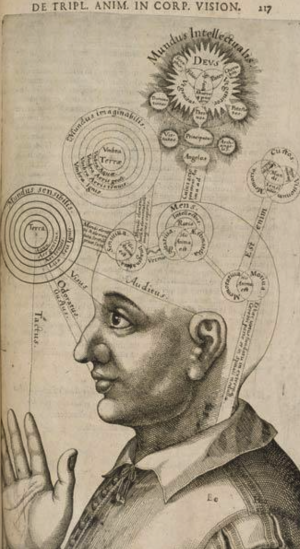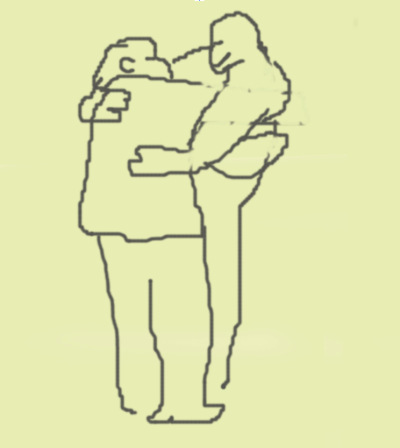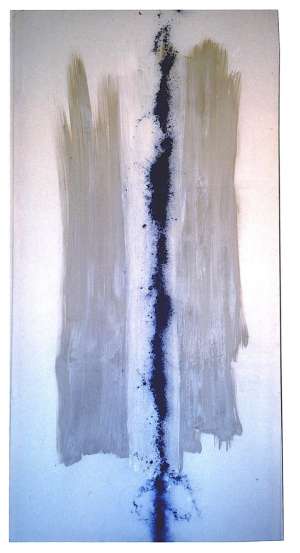by Emilio Fantin
This essay was written in 2020, during the COVID-19 pandemic.
Culture and nature: the logical challenge
This is a poetic and resistance attempt to avoid being subjected to a digital format. Covid 19 has only accelerated the process that started with the informatics era, during the Second World War. We have not yet learned how to combine technology and humanism. While we want to continue to share our thoughts, words and emotions online, we are not ready to renounce our human condition (hopefully).
Since it seems that we cannot smell, taste, touch and warm ourselves as we did before Covid 19, slowly, step by step, we are accepting to give up our humanity and are becoming digital profiles, reducing ourselves to graphic icons. Of course somebody could say: Yes, but we are lucky to have such technological tools, otherwise we’d be completely isolated. Yet, this is not the point. The point is, how can we use technology in a different way?
First of all, let’s balance the time that we spend in front of a screen with the time that we spend in a forest, in a city, in the mountain, or at home. I invite you to dedicate the same amount of time you spend engaging in virtual digital activities to real, analogic activities. If we spend one hour in front of a screen, let’s walk in the park, read a book, play piano, or do housework for one hour. We need some discipline in order to train our bodies and spirits. But we cannot do anything in isolation. During this time we need to be together in spirit. Sharing our imagination means being in spirit with others: imagining how people feel or respond in certain moments, connected by an invisible flux that is not provided by wifi.
This is not anti-technological nostalgia or a way to highlight a contrived level of purity as to ‘how we were’ or ‘how we should be’. On the contrary, it means to imagine the future as a time when humans’ intellectual qualities and intuitive capabilities will be developed autonomously: this does not mean that we will not use technology, rather it means that we will not be subdued or controlled by it.
Let’s consider what technology means today. What is the real goal of technological research? Through new algorithms, many technological advances aim to produce software that enhances our lives, by reducing the amount of time put toward thinking activities and avoiding the necessary effort it takes to hold on to analogic processes. With the use of a keyboard, we are able to avoid some consequential steps which would otherwise belong to our consciousness. If we accept that a machine will free us from any action, on one hand, we might slowly relax and feel free, on the other hand, our consciousness will become less useful and functional because the process of thinking and acting will be completely delegated to an external device.
This might all sound like an exaggeration, and yet it is a matter of logic.
The conflict between nature and culture here is at stake.
Is thinking generated by the brain?
This question might seem redundant for those whose perspective it is that thinking is an effect of the activity of the brain.
Alternatively, there are those who perceive the brain as a function of thinking, precisely because the brain is part of the nervous system which allows the articulation of thinking.
That means that thinking preexists in the brain.
We are living among different forms of existence which infer different spatial and temporal coordinates which can also infer infinite time or no time. Thinking is a form of existence that is translated into temporal and spatial dimensions and shared by all humans.

Consciousness as a continuum.
Is there a difference between consciousness and thinking? People who fall into a coma are not able to articulate any thinking, but for many of them, it is still possible to come back to thinking and reactivate all or part of the functions of the brain. We say that, at that precise moment, these people are not conscious of themselves. It seems that consciousness is something that comes and goes but it is continuously present in different states: being awake, sleeping, dreaming, meditating, and going into a coma.
Instead, thinking is articulated by reasoning through brain activity, which refers to neurons, synapses, nerve cells, and electrical currents.
Where does the idea that the highest level of meditation refers to the control of thinking activity come from? According to many meditative practices, consciousness emerges when one breaks her/his flow of reasoning.
In our dreams we are not conscious of ourselves as we are when awake: we might wonder what kind of reasoning we activate during dreams. Indeed, even if situations and facts can be more contradictory in dreams, the way in which we decode dreams and translate them into words, is the same as the way we decode facts in real life.
De-humanization
From a logical point of view, both reason and consciousness have to do with mathematical aspects – although reason is an applied function of thinking and consciousness can be imagined as if it were a function of itself.
Humans have understood that they need reason to develop consciousness, but reason itself yearns to become a function of itself in order to annihilate human consciousness and be a substitute for it. These are the ultimate goals of Artificial Intelligence: to develop a series of algorithms that generate and improve upon themselves through recursive self-improvement until they are able to conquer states of consciousness.
It is up to us to balance this conflict between consciousness and reason.
In its self-referential process, reason produces automatisms that do not have the power of a complex state of consciousness but can be very dangerous and contribute to processes of dehumanization. These automatisms act in many different fields of life.
Self-referential aspects occur in cases of Artificial intelligence applications, i.e robots, in which logical elaborations permit some autonomy in decision-making.
Self-reference is an ancient concept and can be simply applied to geometric patterns: to graphically understand the power of self-reference let us consider this image.

Self-reference and self-generation. The white forms of this image do not exist. They are automatically generated by the difference between foreground and background. Each time a colored form is translated and rotated automatically it generates a white one.
Automatisms which generate a lack of consciousness, produce forms of de-humanization
Media and Digital Communication
Media and Digital Communication which increase dehumanized thinking, enable a disastrous horizon for cultural processes, societal and public well-being, health systems, and economic stability.
One can see how communication and information systems are ambiguous considering that most online documents cannot be 100% trusted. There is always something ambiguously stated, in order to hide different forms of interests, from both institutional culture and countercultural documents and ideologies.
When we look for information, we tend to search for something that confirms our opinions.
In the big mess of the Internet, the communication infrastructure produces auto-referential automatisms which generate those conceptual entities, and then which appear as given, as original, able to act in our consciousness. In this condition, it is very important to constantly pay attention. This means a deep and awake attention to texts, pictures, videos, and editing published across the Internet. It does not matter which political or social group or party they emerge from. These auto-referential automatisms parasite any form of communication, be they words or images, nourishing themselves through those feelings that reassure us and belong to our ideologies, beliefs, ethics, and ideals which please us. We have to constantly make an effort to respect the distance not from other people but from ourselves.
Healing relationships
The application of some specific scientific paradigms and juridical purposes in the field of medicine gives space to distorted views of the meaning of healing.
1) The systematic generalization of statistical concepts to face complex phenomena, for example, the Covid 19 infection has brought us to a wrong interpretation of the concept of “epidemic”. The generalization of the idea of prevention, for example, mandatory vaccinations, brings us to the wrong application of vaccination therapy. In an ideal way, medicine should consider each of us, case by case. Vaccines should be used only in some cases, not as generalized therapy. Each one of us has a different relationship between our environment and our body. Many people can fight viruses with their own immune systems. Scientific research should be directed toward prevention in order to improve our overall immune system. This can be done with different approaches: on one hand by improving our quality of life (being less egoistic and taking care of humans and the non-human world around us), on the other hand by challenging western culture’s obsession with hygienic and antiseptic environments.
2) By adapting any therapy to a standard medical protocol makes it so that the results of a medical consultation saves any doctor from the consequences of possible legal problems. It also condemns the patient to taking standard medicines even if he/her does not need them, or, even worse, these standardized approaches might damage her/him.
3) The idea of a perfect science and technology brings forth the false illusion of the infallibility of science. The perfectibility of the results takes place at the expense of individual freedom.
Future medicine, according to many conventional medical researchers, will be the field of a totalizing automatization and digitalization. This objectifies humanity by reducing humans to abstract entities. This is the consequence of the diffusion of many rooted paradigms within western thinking. It underlines the idea that the more automatized a device is, the less error will occur. Robot and artificial intelligence applications have been used in medicine for decades but it is simply banal and extremely dangerous to consider such devices as substitutes for human beings.
Denying human subjectivity in order to affirm an alleged idea of objectivity is the first step in developing a dehumanized medicine. By avoiding doctor / patient relationships we exclude care and empathy which are important therapeutic elements. Overall we deny the individuality of each person. ll of this smells of death. The irresponsibility of the doctor (who always has her/his/their butt covered) is a danger and it reduces the importance of the physical and spiritual relationship between doctor and patient.

Cultural paradigms
Claiming that science and technology can absolutely avoid error (i.e. subjectivity) is a simplistic approach because the error cannot be avoided a priori; a perfect objective science doesn’t exist. In this sense, substituting an empathic and healing personal relationship with a physician, with a standardized treatment protocol because this protocol would guarantee a smaller margin of error, is banal. Grasping the whole picture requires us to enter into a new kind of relationship where reciprocity and mutual responsibility between two fellow human beings is not a rare occurrence but a genuine possibility for flourishing.
This would also require us to risk leaving our comfort zone to go beyond our cultural paradigm of securing control at all costs. Going beyond these schisms may open a door to a fundamental transformation in how we relate to life and death, with fellow human and non-human beings.
In this current moment, the concept of Biopolitics is topical. Health will be the new political tool. Conceptual errors are not only for scientists’ or experts’ assertions… All of us are carrying on our shoulders, without being aware, many conceptual prejudices. During Covid 19 times, people have been trying to understand if there was someone – multinationals, lobbyists, and so on – who deliberately drove things in a certain direction, while many conspiracy theories were proclaimed. But, if on one hand, we try to define our enemies who control us, imposing on us their will or exploiting our life, on the other hand, we are contributing to this definition of victimization in ourselves. We are, in a certain sense, helping design the structure in which we are imprisoned. By consolidating our opposition through a Manichean approach, which means focusing our attention on the individuation or even on the construction of an enemy, we reinforce those confines from which we want to escape.
It is more and more complicated to understand how to react, protest and defend our dignity without falling into such a trap. I think Covid 19 gives us the occasion to analyze the nature of these self-referential automatisms because their parasitic behavior is similar to the one of the virus. In the same way that the Virus affects our body, these automatisms affect our conceptual apparatus. They share the same strategy.
Viruslessical 1
Lessical virus is a meaning hidden in a linguistic container that reproduces itself only inside a hosting word. An Infected meaning is specialized in binding or overlapping itself on a given original meaning that is inside the hosting word. Some lessical viruses only inject attributes into the hosting words, others, penetrate entirely into the word, and subsequently, they get rid of its container. Infected signifiers integrate with those of the hosting word. At this point, the original meaning of the word changes into a new meaning, that is itself a virus that can infect other words. Viruses are parasites and they become poison carriers. Language control is needed, even if it is difficult in our everyday life. Viruses lurk in sophisticated words, but they do not disdain common words, those that are often spoken and heard at home, at work, and above all, at school. How can we fight these pathologic forms?
We can continue this metaphorical relationship between language and pathologies by talking about the “consciousness immune system”. We might say that what fights lessical viruses is the “consciousness immune system” (…)
We should be able to analyze and recognize when a word is in excess, when it is used only for our own advantage, when it enables us to not challenge our certitudes (…)
What makes us infected word carriers is the lack of consciousness (…) If we were aware of our lexicon, we would not compromise our conversation, that, if left to itself, generates automatisms that spring to polemic, quarrel, or plebiscite.
It is very difficult to identify and control these automatic devices, which manifest themselves not only through words but also through facts. Our attitude towards technology has compromised our attention to consciousness. The delegation of many of our actions to technological devices induces us to act unconsciously (…) For example when we “copy and paste” – this makes life easier for us, we abdicate to our consciousness and delegate the commitment to an external factor. If we do not transcribe by hand, word by word, we are not completely aware of the connection between our gesture and our thinking. The lack of this connection makes the coherence of the new text more fragile.
Can this connection trigger a poetic act of resistance to try and avoid automatisms?

Imagination and sensitivity are those elements that connect us to any existing living form. What we are used to imagining about any form of life inspires us by the form of life itself which shares with us its existence.
On this occasion, I invite you to share your imagination and sensitivity in order to overcome the static nature of digital communication formats and draw a more poetic and evocative space.
Emilio Fantin creates the conditions for dialectic interaction between different types of knowledge. He generates spaces and situations in which he invites people to share a non-geographical area, an area in which intense dynamics of exchange arise, with the aim of experimenting what he calls “the aesthetic of not perceivable”. He collaborated with international institutions as well independent realities. https://www.poeticsofnonperceptible.com/


